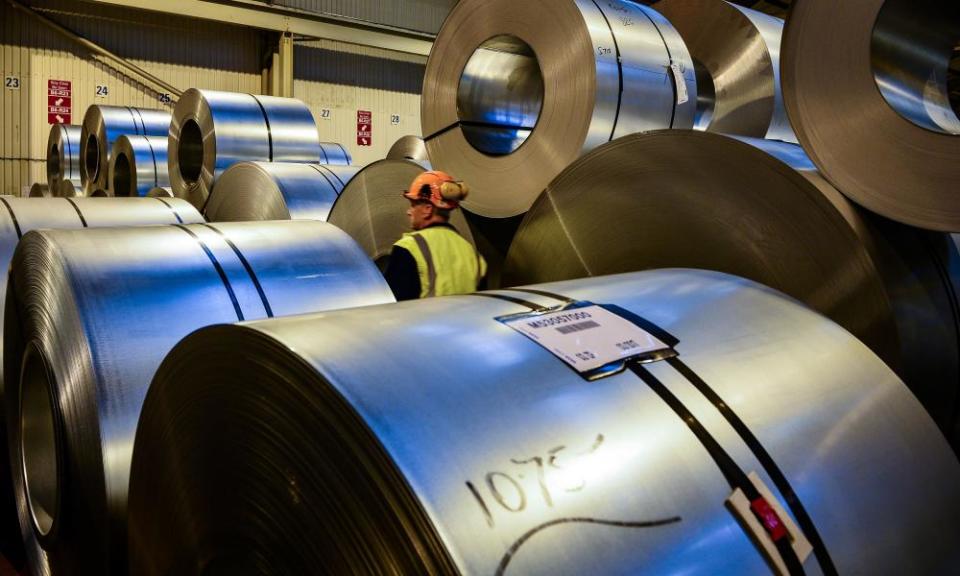Sterling's fall buoys UK manufacturers as export orders rise

UK factories have cashed in on the sharp fall in the pound since the Brexit vote, with export orders at the joint highest level in three and a half years.
The stronger than expected findings from a survey by the CBI, the UK business trade body, suggest manufacturers had a decent start to the second quarter, boosting hopes that the sector will help prop up the wider economy as a consumer slowdown takes hold.
“The summer sun has come out early for Britain’s manufacturers. Robust demand at both home and abroad is reflected in strong order books, and output is picking up the pace,” said Rain Newton-Smith, chief economist at the CBI.
Factories also enjoyed strong demand from domestic customers, driving total order books to the highest level in more than two years, according to the CBI’s latest industrial trends survey.
In a further sign of strength, output at Britain’s factories grew at the fastest pace since December 2013, underpinned by the mechanical engineering and chemicals sectors. Firms expected production to rise again in the coming quarter.
Of the 432 firms that took part in the survey, conducted between 25 April and 12 May, 22% said their export order books were above normal for the time of year, while 12% said they were below normal. That gave a balance of +10%, the joint highest balance since December 2013.
Economists said strong export orders were a sign that manufacturers were benefiting from a drop in the value of the pound since the Brexit vote last June. The pound is about 13% lower against the dollar than it was on the day of the referendum, making British-made goods cheaper abroad.
“The improvement in the export orders balance, to its joint highest since December 2013, indicates that the drop in the pound is still having substantial positive effects for manufacturing exporters,” said Ruth Gregory, UK economist at Capital Economics.
“The upbeat survey supports our view that the manufacturing sector should perform well this year and help to offset some of the slowdown in consumer spending growth.”
Manufacturers have reported factories working at full capacity in recent months to meet demand from overseas customers benefiting from the low pound. The EEF, which represents manufacturing firms, said last week that orders were improving as UK exporters enjoyed an improved competitive position “vis-a-vis the pound depreciation” and global growth picked up strongly from a dip last year.
But there is anecdotal evidence that while manufacturers have boosted production, they remain reluctant to increase investment and expand capacity. Many remain nervous that the fallout from the Brexit negotiations may harm the economy.
They are also concerned that sterling could rise, wiping out the benefit for exporters, should the Brexit talks proceed smoothly and the UK strike a beneficial trade deal with Brussels.
The CBI pointed out that although orders and output were up at UK factories, manufacturers were facing higher costs for imported raw materials. As a result, firms were expecting to raise their selling prices.
“On the other side of the coin, we have mounting cost pressures and expectations for factory-gate price rises are running high,” said Newton-Smith. “Boosting productivity is key to alleviating some of the cost pressures that manufacturers are facing. Sustained investment in innovation and education will be vital to shore up the success of British industry.”
The CBI findings ended a mixed week for economic data. The latest official jobs figures show prices rose at a faster pace than pay in the first three months of the year, putting household budgets under increased pressure. But they also show record levels of employment, with unemployment at a 42-year low.
Workers’ average earnings rose by 2.1% year on year in the three months to March, while inflation was 2.3% in the same period.
Retail sales jumped 2.3% in April, rebounding from a 1.4% fall in March as the warmer weather and Easter holidays encouraged shoppers back on to Britain’s high streets. It was more than double the 1% increase predicted by economists, and suggested consumers were willing to put aside fears over falling living standards.

 Yahoo Finance
Yahoo Finance 